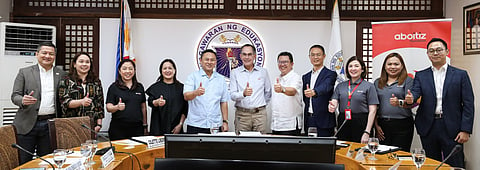
- NEWS
- the EDIT
- COMMENTARY
- BUSINESS
- LIFE
- SHOW
- ACTION
- GLOBAL GOALS
- SNAPS
- DYARYO TIRADA
- MORE

Last-mile schools (LMS) are infamous for being hard to reach. Students of such geographically isolated schools leave home before sunrise and trek for hours to make it to their morning class on time. They even take the risk of crossing rivers and climbing mountains just to get there.
Accessibility is just one of the challenges facing LMS students. They are also academically disadvantaged compared to their urban counterparts as remote LMS are usually off-grid. The lack of electricity means not only discomfort on hot days but also learning without connectivity. Teachers are also affected as the lack of Wi-Fi, power and signal hampers accessing learning resources online.
The thousands of LMS across the country are not surprising amid modern times as the Department of Education (DepEd) continuously builds such facilities to serve children in far-flung communities, including indigenous peoples. However, DepEd’s LMS program started in 2019 and involves not only constructing or renovating classroom buildings with help from the Department of Public Works and Highways but also equipping these with electricity in partnership with the National Electrification Administration, which designs the electrification system for off-grid schools.
Bolstering the LMS program is DepEd’s partnership with the Aboitiz Foundation, the social services arm of the techglomerate Aboitiz Group. Aboitiz Foundation’s aid consists not only of electricity but also connectivity and training to sustain its donated power and Internet service.
Classrooms of schools without electricity are illuminated by natural light. Teachers use traditional method of teaching instead of computers and TV. The Aeta students and teachers at the Iram II Elementary School (I2ES) in Sitio Mampweng, Old Cabalan, Olongapo City, Zambales overcame similar conditions after it underwent a makeover through the so-called AuroraPH program of Aboitiz Foundation, one of DepEd’s partners to its LMS program. Solar panels were installed on the roof of the I2ES by another project partner, Subic EnerZone of AboitizPower, to generate electricity.
Aboitiz Foundation and its partners also donated computer equipment, a Starlink kit for satellite-based Internet service and access to e-learning platforms that students and teachers can use for interactive and up-to-date educational content.
“For many remote schools, access to electricity means finally lighting up classrooms, powering computers, and connecting with the world — providing essential resources that have long been out of reach,” said Sabin Aboitiz, chairman of Aboitiz Foundation.
Aside from I2ES, also initially benefitting from the AuroraPH are Awing Elementary School, Bakian Guiniawan Elementary School, Naswak Elementary School, Piminggan Elementary School, Marcelo Marques National High School, Daynet Elementary School and Labney Primary School, all in Benguet province. Other beneficiaries are the Pangan-an Elementary School and Pangan-an High School in Lapu-Lapu City, Cebu, as well as Kabangbang and Lapinig Elementary Schools in Barangay Gumitan, Marilog District, Davao City.
About 300 off-grid public schools are likewise AuroraPH beneficiaries under a memorandum of agreement signed by DepEd Secretary Juan Edgardo “Sonny” Angara and Aboitiz Foundation on 3 April.
Twelve pilot schools will be completed by 2025. Each will receive two 5-kilowatt solar power systems to light up classrooms. Laptops and tablets pre-loaded with educational software will be distributed, and teachers will be trained to integrate technology into everyday lessons.
“We want to ensure that the needs of students are prioritized. We are laying the groundwork for inclusive education and digital empowerment,” said Aboitiz.
“This is not a short-term donation, it is a sustainable and scalable solution — one that supports DepEd’s strategic goals, aligns with global development priorities, and reflects the Aboitiz Group’s commitment to advance education, innovation and inclusive growth,” he added.
Aboitiz Foundation embraces technology and innovation as tools for meaningful change.
“The AuroraPH Project is not just about solar panels — it’s about empowering schools and communities to thrive in ways that have never been possible before,” according to Aboitiz.
With consistent access to electricity and internet, students and teachers in LMS can fully utilize digital learning tools, leading to improved educational outcomes.
AuroraPH empowers students by providing access to high-quality learning materials, It aims to improve literacy and numeracy rates, equipping students with the skills needed for lifelong learning and success.
To ensure long-term functionality of solar panels and internet connectivity, however, requires technical expertise and ongoing maintenance. Thus, training local stakeholders, such as teachers and community members to handle basic troubleshooting, and partnering with organizations for system support are part and package of the AuroraPH.
Meanwhile, AuroraPH will expand by engaging government agencies, private sector partners, and mission-aligned organizations that share Aboitiz Foundation’s vision.
Scaling up requires substantial investment in equipment, manpower, and technology so strengthening partnerships with the government, private sector and other agencies is necessary.
“By leveraging collective resources, expertise, and funding, we can accelerate deployment to more sitios and last-mile schools,” according to Aboitiz Foundation.
“Synergy with key stakeholders who share our vision and values ensures sustainable growth and impact,” it added.
